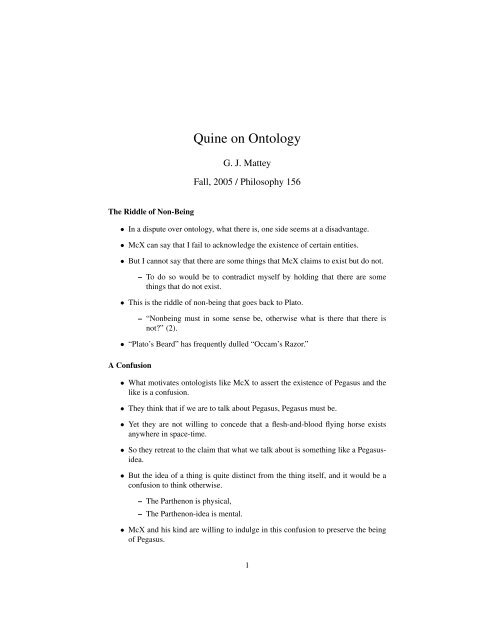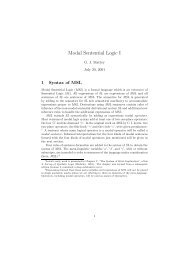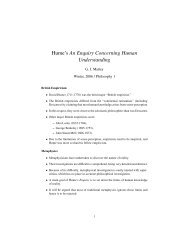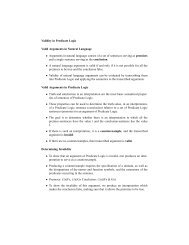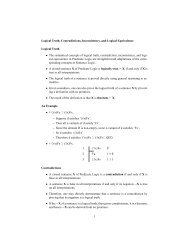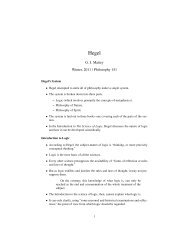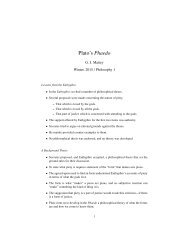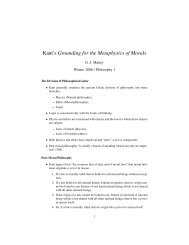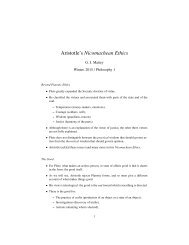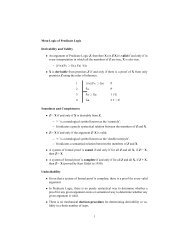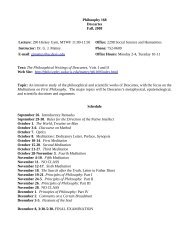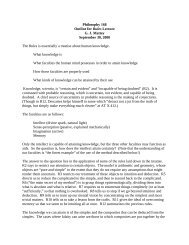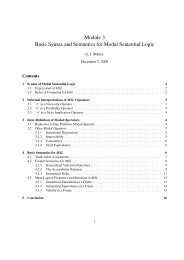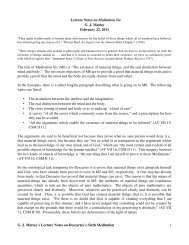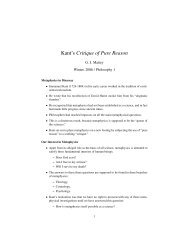Quine on Ontology - the UC Davis Philosophy Department
Quine on Ontology - the UC Davis Philosophy Department
Quine on Ontology - the UC Davis Philosophy Department
You also want an ePaper? Increase the reach of your titles
YUMPU automatically turns print PDFs into web optimized ePapers that Google loves.
<str<strong>on</strong>g>Quine</str<strong>on</strong>g> <strong>on</strong> <strong>Ontology</strong><br />
G. J. Mattey<br />
Fall, 2005 / <strong>Philosophy</strong> 156<br />
The Riddle of N<strong>on</strong>-Being<br />
• In a dispute over <strong>on</strong>tology, what <strong>the</strong>re is, <strong>on</strong>e side seems at a disadvantage.<br />
• McX can say that I fail to acknowledge <strong>the</strong> existence of certain entities.<br />
• But I cannot say that <strong>the</strong>re are some things that McX claims to exist but do not.<br />
– To do so would be to c<strong>on</strong>tradict myself by holding that <strong>the</strong>re are some<br />
things that do not exist.<br />
• This is <strong>the</strong> riddle of n<strong>on</strong>-being that goes back to Plato.<br />
– “N<strong>on</strong>being must in some sense be, o<strong>the</strong>rwise what is <strong>the</strong>re that <strong>the</strong>re is<br />
not?” (2).<br />
• “Plato’s Beard” has frequently dulled “Occam’s Razor.”<br />
A C<strong>on</strong>fusi<strong>on</strong><br />
• What motivates <strong>on</strong>tologists like McX to assert <strong>the</strong> existence of Pegasus and <strong>the</strong><br />
like is a c<strong>on</strong>fusi<strong>on</strong>.<br />
• They think that if we are to talk about Pegasus, Pegasus must be.<br />
• Yet <strong>the</strong>y are not willing to c<strong>on</strong>cede that a flesh-and-blood flying horse exists<br />
anywhere in space-time.<br />
• So <strong>the</strong>y retreat to <strong>the</strong> claim that what we talk about is something like a Pegasusidea.<br />
• But <strong>the</strong> idea of a thing is quite distinct from <strong>the</strong> thing itself, and it would be a<br />
c<strong>on</strong>fusi<strong>on</strong> to think o<strong>the</strong>rwise.<br />
– The Par<strong>the</strong>n<strong>on</strong> is physical,<br />
– The Par<strong>the</strong>n<strong>on</strong>-idea is mental.<br />
• McX and his kind are willing to indulge in this c<strong>on</strong>fusi<strong>on</strong> to preserve <strong>the</strong> being<br />
of Pegasus.<br />
1
Unactualized Possibles<br />
• The c<strong>on</strong>fusi<strong>on</strong> of a thing with its idea can be avoided by adopting a more sophisticated<br />
<strong>the</strong>ory of Pegasus.<br />
• An <strong>on</strong>tologist we will call “Wyman” views Pegasus as a possible being which is<br />
unactualized.<br />
• To say that <strong>the</strong>re is no such thing as Pegasus is to say that Pegasus lacks <strong>the</strong><br />
attribute of actuality.<br />
• This is similar to saying of <strong>the</strong> Par<strong>the</strong>n<strong>on</strong> that it lacks <strong>the</strong> attribute of being red.<br />
• The being of Pegasus and <strong>the</strong> Par<strong>the</strong>n<strong>on</strong> are <strong>the</strong>n unquesti<strong>on</strong>ed.<br />
Denying Existence<br />
• Wyman attempts be agreeable by denying that Pegasus exists.<br />
• But he denies <strong>the</strong> existence of Pegasus for <strong>the</strong> wr<strong>on</strong>g reas<strong>on</strong>s.<br />
• In <strong>the</strong> comm<strong>on</strong> sense usage of “exists,” when we deny existence we deny that<br />
<strong>the</strong>re is any such thing at all.<br />
• We deny that Pegasus exists because:<br />
– There is no Pegasus in space-time,<br />
– It is a fact specific to Pegasus that if Pegasus existed, <strong>the</strong>n he would be in<br />
space-time.<br />
• For Wyman, <strong>the</strong> problem is different:<br />
– There is no Pegasus in space-time,<br />
– Anything which existed would be in space-time.<br />
• But <strong>the</strong> sec<strong>on</strong>d claim is c<strong>on</strong>tradicted by <strong>the</strong> existence of numbers like <strong>the</strong> cube<br />
root of 27.<br />
A Slum of Possibles<br />
• Wyman’s universe of actualized and unactualized possibles is over-populated.<br />
• It offends <strong>the</strong> aes<strong>the</strong>tic sensibilities of those who have a taste for desert landscapes.<br />
• More importantly, it is disorderly, raising difficult questi<strong>on</strong>s about <strong>the</strong> identity of<br />
unactualized possibles.<br />
– Are <strong>the</strong> possible fat man and <strong>the</strong> possible bald man in <strong>the</strong> doorway <strong>the</strong> same<br />
or distinct, and how are we to decide?<br />
2
– How many possible fat men in <strong>the</strong> doorway are <strong>the</strong>re, and how does <strong>the</strong>ir<br />
number compare with that of possible thin men in <strong>the</strong> doorway?<br />
– Does <strong>the</strong>ir being alike make <strong>the</strong>m <strong>on</strong>e or not?<br />
– Does <strong>the</strong> c<strong>on</strong>cept of identity even apply to <strong>the</strong>m?<br />
• It seems to make no sense of talking about entities “which cannot meaningfully<br />
be said to be identical with <strong>the</strong>mselves and distinct from <strong>on</strong>e ano<strong>the</strong>r” (4).<br />
Impossibility<br />
• If Wyman’s strategy is to be completely general, it would have to grant being to<br />
<strong>the</strong> round square cupola <strong>on</strong> Berkeley College.<br />
• But such a being is impossible, which leaves <strong>on</strong>ly two opti<strong>on</strong>s:<br />
– To admit that <strong>the</strong>re are unactualized impossibles,<br />
– To claim that <strong>the</strong> expressi<strong>on</strong> “<strong>the</strong> round square cupola” is meaningless.<br />
• The first approach threatens c<strong>on</strong>tradicti<strong>on</strong>, so Wyman embraces <strong>the</strong> sec<strong>on</strong>d.<br />
• But it has no intrinsic appeal, and has even led its prop<strong>on</strong>ents to challege <strong>the</strong><br />
argument-form reductio ad absurdum, which may be a reductio against <strong>the</strong> view<br />
itself.<br />
• Due to a result by Church in symbolic logic, it would be impossible to determine<br />
systematically which expressi<strong>on</strong>s are c<strong>on</strong>tradictory and hence meaningless.<br />
Russell’s Partial Soluti<strong>on</strong><br />
• Russell solves <strong>the</strong> problem of n<strong>on</strong>-being for a limited class of expressi<strong>on</strong>s: definite<br />
descripti<strong>on</strong>s.<br />
• We have already seen that Russell analyzes whole sentences c<strong>on</strong>taining <strong>the</strong> descripti<strong>on</strong>s,<br />
ra<strong>the</strong>r than <strong>the</strong> descripti<strong>on</strong>s <strong>the</strong>mselves.<br />
• The descriptive phrase no l<strong>on</strong>ger carries <strong>the</strong> burden of reference.<br />
• It is shifted to quantificati<strong>on</strong>al words (“bound variables”) such as “something,”<br />
“nothing,” “everything.”<br />
• Such words “do not purport to be names at all; <strong>the</strong>y refer to entities generally,<br />
with a kind of studied ambiguity peculiar to <strong>the</strong>mselves” (6).<br />
• One can meaningfully assert that, e.g., <strong>the</strong> author of Waverly does not exist without<br />
taking <strong>the</strong> descripti<strong>on</strong> to refer to any kind of entity.<br />
3
Generalizing Russell’s Soluti<strong>on</strong><br />
• Russell’s soluti<strong>on</strong> to <strong>the</strong> problem of n<strong>on</strong>-being applies <strong>on</strong>ly to descriptive phrases,<br />
but it can be generalized to apply to proper names.<br />
• We can substitute a descripti<strong>on</strong> for a name such as “Pegasus.”<br />
– “The winged horse captured by Belleroph<strong>on</strong>.”<br />
• If <strong>the</strong>re is no such analysis available, we can use various devices to <strong>the</strong> same<br />
effect:<br />
– “The thing that is-Pegasus,”<br />
– “The thing that pegasizes.”<br />
• <str<strong>on</strong>g>Quine</str<strong>on</strong>g> voices no objecti<strong>on</strong> to <strong>the</strong> possibility that he is committed to <strong>the</strong>re being<br />
attributes such as being Pegasus or pegasizing.<br />
Meaning and Naming<br />
• The c<strong>on</strong>fusi<strong>on</strong> behind <strong>the</strong> problem of n<strong>on</strong>-being might have been avoided had<br />
<strong>the</strong> <strong>on</strong>tologists recognized a distincti<strong>on</strong> between meaning and naming.<br />
• In Frege’s example, “Morning Star” and “Evening Star” name <strong>the</strong> same thing but<br />
have different meanings.<br />
– O<strong>the</strong>rwise, <strong>on</strong>e could have learned <strong>the</strong> identity of what <strong>the</strong> two expressi<strong>on</strong><br />
name simply by reflecting <strong>on</strong> <strong>the</strong>ir meanings.<br />
• The urge to find an entity for “Pegasus” to name for it to be meaningful may well<br />
have been resp<strong>on</strong>sible for <strong>the</strong> view that “Pegasus” must name an idea in order to<br />
have meaning.<br />
Universals<br />
• McX thinks that <strong>the</strong>re are universals: such entities as attributes, relati<strong>on</strong>s, classes,<br />
numbers and functi<strong>on</strong>s.<br />
• He may argue, for example, that from <strong>the</strong> fact that <strong>the</strong>re are red houses, red roses,<br />
and red sunsets, it follows that <strong>the</strong>re is something in comm<strong>on</strong>: redness.<br />
• This fact reflects McX’s “c<strong>on</strong>ceptual scheme,” within which <strong>the</strong> being of redness<br />
is trivial.<br />
• “Ontological statements follow immediately from all manner of casual statements<br />
of comm<strong>on</strong>place fact” (10).<br />
• But <strong>on</strong>e can without loss of explanatory power have a c<strong>on</strong>ceptual scheme in<br />
which <strong>the</strong>re is nothing in comm<strong>on</strong> between red houses, roses, and sunsets.<br />
• The fact that “red” is true of all of <strong>the</strong>m is in this scheme “ultimate and irreducible.”<br />
4
Meanings<br />
• Even if attributes are not admitted in a c<strong>on</strong>ceptual scheme, it seems at least that<br />
<strong>the</strong> universals meanings must be retained.<br />
• If an expressi<strong>on</strong> is to be meaningful, it must have a meaning.<br />
• But it could be allowed that expressi<strong>on</strong>s are meaningful, and that meaningfulness<br />
(or “significance”) is ei<strong>the</strong>r:<br />
– “An ultimate and unanalyzable matter of fact,” or<br />
– A matter of how people behave in <strong>the</strong> presence of linguistic utterances.<br />
• We can operate with <strong>the</strong> noti<strong>on</strong>s of “significance” and “syn<strong>on</strong>omy” while dispensing<br />
with “special and irreducible intermediary entities” (12).<br />
Ontological Commitment<br />
• The use of names does not commit us to corresp<strong>on</strong>ding entities, nor does <strong>the</strong> use<br />
of predicates commit us to corresp<strong>on</strong>ding attributes or meanings.<br />
• But we do not altoge<strong>the</strong>r avoid <strong>on</strong>tological commitment in our use of language.<br />
• The use of quantificati<strong>on</strong>al words (“bound variables”) does engender a commitment.<br />
– I am committed to attributes when I say, “There is something which red<br />
houses and sunsets have in comm<strong>on</strong>.”<br />
– I am committed to numbers when I say, “There is a prime number larger<br />
than a milli<strong>on</strong>.”<br />
• This is <strong>the</strong> <strong>on</strong>ly way in which use of language brings with it <strong>on</strong>tological commitment.<br />
• “To be assumed as an entity is, purely and simply, to be reck<strong>on</strong>ed as <strong>the</strong> value of<br />
a variable” (13).<br />
Ma<strong>the</strong>matical Entities<br />
• C<strong>on</strong>temporary debates about <strong>the</strong> <strong>on</strong>tology of ma<strong>the</strong>matics replicate <strong>the</strong> debates<br />
in <strong>the</strong> Middle Ages about universals.<br />
– Realism (<strong>the</strong>re are universals): logicism, which makes all kinds of abstract<br />
entities <strong>the</strong> values of bound variables.<br />
– C<strong>on</strong>ceptualism (universals are mind-made): intuiti<strong>on</strong>ism, which requires<br />
that abstract entities be “c<strong>on</strong>structed,” and limits ma<strong>the</strong>matics.<br />
– Nominalism (<strong>the</strong>re are no universals): formalism, which regards ma<strong>the</strong>matics<br />
as “a play of insignificant notati<strong>on</strong>s” (15).<br />
• “The sort of <strong>on</strong>tology we adopt can be c<strong>on</strong>sequential—notably in c<strong>on</strong>necti<strong>on</strong><br />
with ma<strong>the</strong>matics, though this is <strong>on</strong>ly an example” (15).<br />
5
The Semantical Plane<br />
• Looking at <strong>the</strong> values of variables <strong>on</strong>ly reveals what our language commits us to,<br />
not what <strong>the</strong>re is.<br />
• Still, it is best to approach <strong>the</strong> questi<strong>on</strong> of what <strong>the</strong>re is by “withdrawing to a<br />
semantical plane” (16).<br />
• On <strong>the</strong> semantical level, <strong>on</strong>e can describe disagreements with rival <strong>on</strong>tologies by<br />
characterizing <strong>the</strong> statements that <strong>the</strong> rivals affirm, without being committed to<br />
<strong>the</strong> entities to which <strong>the</strong>y are committed.<br />
• The semantical level serves as a comm<strong>on</strong> ground of communicati<strong>on</strong> for people<br />
with rival c<strong>on</strong>ceptual schemes.<br />
• This at least delays <strong>the</strong> collapse of <strong>the</strong> debate into questi<strong>on</strong>-begging.<br />
Accepting an <strong>Ontology</strong><br />
• Accepting an <strong>on</strong>tology is like accepting a scientific <strong>the</strong>ory.<br />
• “We adopt, at least insofar as we are reas<strong>on</strong>able, <strong>the</strong> simplest c<strong>on</strong>ceptual scheme<br />
into which <strong>the</strong> disordered fragments of raw experience can be fitted and arranged”<br />
(16).<br />
• For example, we can arrange our experience according to (at least) <strong>on</strong>e of two<br />
schemes:<br />
– Physicalist: simplifying by talking about physical objects resp<strong>on</strong>sible for<br />
<strong>the</strong> regularity of experience,<br />
– Phenomenalist: simplifying by reducing <strong>the</strong> kinds of entities to “individual<br />
subjective events of sensati<strong>on</strong> or reflecti<strong>on</strong>” (17).<br />
C<strong>on</strong>venient Myths<br />
• From <strong>the</strong> point of view of phenomenalism, <strong>the</strong> postulati<strong>on</strong> of physical objects is<br />
no more than a simplifying myth.<br />
• By analogy, from <strong>the</strong> standpoint of a <strong>the</strong>ory of rati<strong>on</strong>al numbers, <strong>the</strong> postulati<strong>on</strong><br />
of irrati<strong>on</strong>al numbers is a myth that simplifies <strong>the</strong> <strong>the</strong>ory.<br />
• From <strong>the</strong> standpoint of physicalism, <strong>the</strong> postulati<strong>on</strong> of numbers and o<strong>the</strong>r abstract<br />
entities is a higher simplifying myth.<br />
• This is illustrated by <strong>the</strong> ad hoc devices used to overcome paradoxes of set<strong>the</strong>ory.<br />
• And <strong>the</strong>re are paradoxes of physical <strong>the</strong>ory (wave/particle <strong>the</strong>ories of light, Heisenberg’s<br />
indeterminacy principle) which expose <strong>the</strong> mythical character of physics.<br />
6
And <strong>the</strong> Winner Is?<br />
• <str<strong>on</strong>g>Quine</str<strong>on</strong>g> has isolated <strong>the</strong> linguistic device that indicates <strong>on</strong>tological commitment,<br />
but he has far from settled what we ought to be committed to.<br />
• Competing schemes with <strong>the</strong>ir <strong>on</strong>tological commitments ought to be explored<br />
with “tolerance and an experimental spirit” (19).<br />
• The phenomenalistic scheme claims epistemological priority, and from its point<br />
of view, <strong>the</strong> physicalist and ma<strong>the</strong>matical schemes are myths.<br />
• But <strong>the</strong> epistemological point of view is itself simply <strong>on</strong>e of many, “corresp<strong>on</strong>ding<br />
to <strong>on</strong>e am<strong>on</strong>g our various interests and purposes” (19)<br />
• The unstated c<strong>on</strong>clusi<strong>on</strong> is that no point of view can claim ultimate priority over<br />
<strong>the</strong> o<strong>the</strong>rs, and that adopti<strong>on</strong> of a c<strong>on</strong>ceptual scheme is pragmatic.<br />
7


